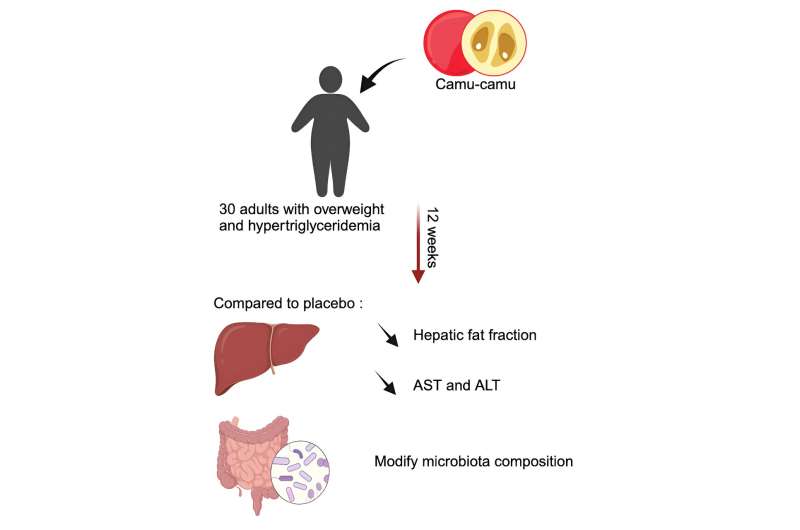This article has been reviewed according to Science X's editorial process and policies. Editors have highlighted the following attributes while ensuring the content's credibility:
fact-checked
peer-reviewed publication
trusted source
proofread
A camu-camu fruit extract to reduce liver fat shows promise in clinical trial

A research team from Université Laval has shown the benefits of camu-camu on non-alcoholic fatty liver disease, which affects over seven million people in Canada. This exotic fruit reduces liver fat levels.
Over 12 weeks, thirty participants took either camu-camu extract or a placebo at different times in this randomized clinical trial. Participants underwent magnetic resonance imaging (MRI) to determine fat levels in the liver. Scientists observed a 7.43% reduction in liver lipids when study participants took camu-camu extract. With the placebo, they noted an 8.42% increase in liver fat.
"That's a significant 15.85% difference," says André Marette, a professor in the Faculty of Medicine and researcher at the Institut universitaire de cardiologie et de pneumologie de Québec—Université Laval (IUCPQ), who led the study.
Polyphenols and the microbiota
This effect stems from the polyphenols contained in camu-camu and their relationship with the intestinal microbiota. "The microbiota metabolizes the large polyphenol molecules that cannot be absorbed by the intestine, transforming them into smaller molecules that the body can assimilate to decrease liver fat," explains André Marette.
His team has identified two potential mechanisms of action for these small polyphenols. "They could reduce lipogenesis, i.e., the formation of lipid droplets in the liver. They could also stimulate lipid degradation by oxidation. A combination of the two mechanisms probably explains the high efficacy of the extract, as we're playing on both sides of the coin," reports Professor Marette, who collaborated with scientists at the Institute of Nutrition and Functional Foods (INAF).

However, the team noted a wide variability in response to camu-camu. "We hypothesize that the initial intestinal microbiota influences the response to polyphenols. If we find the factors involved, we may be able to modify the microbiota and increase the extract efficacy," explains Professor Marette.
Although camu-camu is an exotic fruit, the extract is readily available in capsule form. However, Professor Marette stresses the importance of checking the content of certain polyphenols, as not all commercial products are equivalent.
Cranberries, which also contain a number of partially different polyphenols, could also have a protective effect. In the future, Professor Marette hopes to investigate whether combining camu-camu and cranberry could have a synergistic effect.
The study was published in the journal Cell Reports Medicine. The other authors are Anne-Laure Agrinier, Arianne Morissette, Laurence Daoust, Théo Gignac, Julie Marois, Thibault V. Varin, Geneviève Pilon, Éric Larose, Claudia Gagnon, Yves Desjardins, Fernando F Anhê, Anne-Marie Carreau and Marie-Claude Vohl.
More information: Camu-camu decreases hepatic steatosis and liver injury markers in overweight, hypertriglyceridemic individuals: a randomized crossover trial, Cell Reports Medicine (2024). DOI: 10.1016/j.xcrm.2024.101682. www.cell.com/cell-reports-medi … 2666-3791(24)00403-8


















